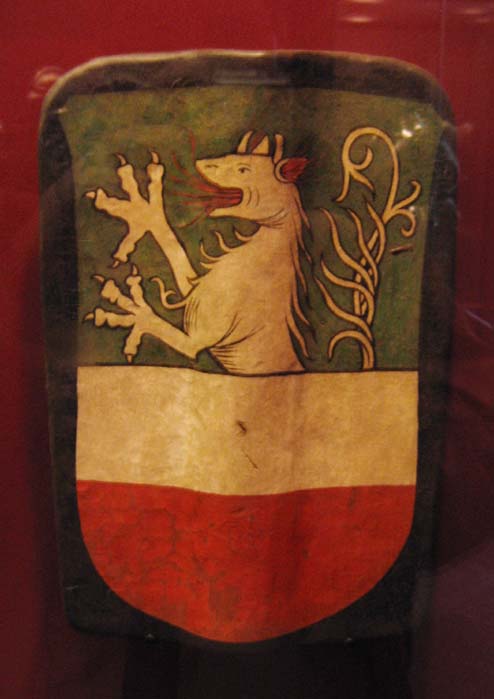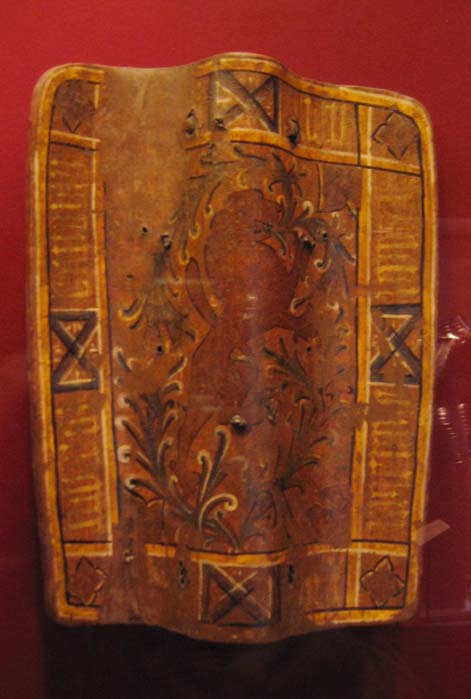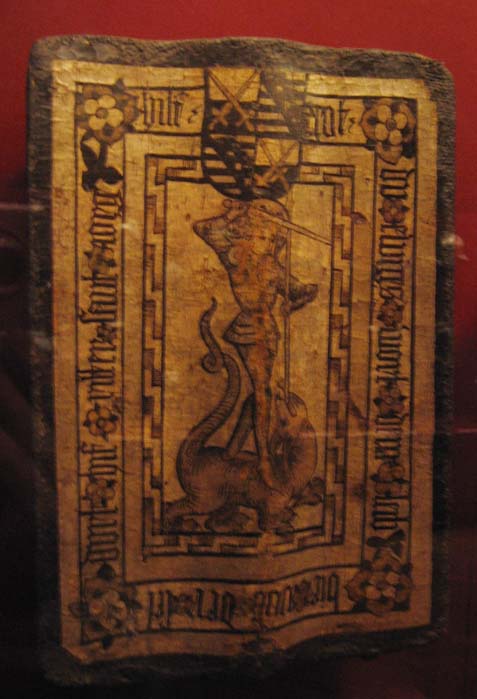Karsten,
That is very nice work and exactly what I aspire to make (or buy) this year. I look forward to seeing your web page about the construction.
Regards
John Waller
Dear all,
in case you are curious - we have set up a web page detailing the construction of our pavise. You can view it here.
I still haven't got around to do the canvas covering - but I did buy gesso. We're going to use modern, acrylic gesso and colors, because we don't want to worry about the waterproof-ness of the historic materials... nor about the lead-based whitening agent (and other toxic stuff) of the old painting paraphenalia.
in case you are curious - we have set up a web page detailing the construction of our pavise. You can view it here.
I still haven't got around to do the canvas covering - but I did buy gesso. We're going to use modern, acrylic gesso and colors, because we don't want to worry about the waterproof-ness of the historic materials... nor about the lead-based whitening agent (and other toxic stuff) of the old painting paraphenalia.
| Karsten Rohweder wrote: |
| Dear all,
in case you are curious - we have set up a web page detailing the construction of our pavise. You can view it here. I still haven't got around to do the canvas covering - but I did buy gesso. We're going to use modern, acrylic gesso and colors, because we don't want to worry about the waterproof-ness of the historic materials... nor about the lead-based whitening agent (and other toxic stuff) of the old painting paraphenalia. |
I'm making one myself at the moment
Plywood construction (I don't trust my carpentry with "real" timber yet)
Canvas covering - which is waterproof in itself
Acrylic Gesso
but I have used authentic tempera paints - the black pigment is ash, with red and yellow ochre. Chosen along the lines of cheapness! I thought blue from lapis lazuli would be a bit decadent.
Not all authentic pigments contained lead - vermillion yes, but you can get appropriate modern substitutes.
I may finish it in shellac
I wish it could look as good as this...
http://www.fuscher.com.pl/awroclaw.htm
Here are three hand pavises from the Met, one of which I posted a different pic of above.
 Attachment: 38.61 KB
Attachment: 38.61 KB

 Attachment: 42.93 KB
Attachment: 42.93 KB

 Attachment: 51.45 KB
Attachment: 51.45 KB




Hello everybody.
Here are two pavises from Museum Lauriacum, Enns, Austria ( http://www.museum-lauriacum.at/ ). Unfortunately without accompanying informations (only dated about 1450):
http://img5.rajce.idnes.cz/d0505/2/2719/27193...9_394_.JPG
http://img5.rajce.idnes.cz/d0505/2/2719/27193...9_396_.JPG
http://img5.rajce.idnes.cz/d0505/2/2719/27193...9_397_.JPG
Here are two pavises from Museum Lauriacum, Enns, Austria ( http://www.museum-lauriacum.at/ ). Unfortunately without accompanying informations (only dated about 1450):
http://img5.rajce.idnes.cz/d0505/2/2719/27193...9_394_.JPG
http://img5.rajce.idnes.cz/d0505/2/2719/27193...9_396_.JPG
http://img5.rajce.idnes.cz/d0505/2/2719/27193...9_397_.JPG
I have a problem with grip in pavises. What leather was he made of? I heard about bull's penis ( :eek: ), but I need the confirmation.
Have Lurked here for a while, but now i decided to post some.
I'm currently building a pavise, but have run into a problem. What to paint it with:
A: Egg tempera. Classic and works well on gesso but from what i understand waterproof so it would probably fall of if i carry the pavise around in wet weather.
B: Oil paints, Also works well on gesso but i don't know how historical accurate it is.
So should i go for A, and try to find some kind of period early 15th century varnish? Or B?
I'm currently building a pavise, but have run into a problem. What to paint it with:
A: Egg tempera. Classic and works well on gesso but from what i understand waterproof so it would probably fall of if i carry the pavise around in wet weather.
B: Oil paints, Also works well on gesso but i don't know how historical accurate it is.
So should i go for A, and try to find some kind of period early 15th century varnish? Or B?
After some thinking i have decided to go for Oil and then cover it with wax to make it the shield more water proof.
Greetings, gentlemen!
As I heard, egg tempera is quite water resist (it will not be pleased, if you soak it into water, but a few drops of rain won't harm it). The main disadvantage of it, that you need a couple of layers of it, if you don't want it to be transparent.
About bull penises...
I don't think so that bull penis was used as the grip of the pavaises, because this... err material was mouch less common than the normal leather. Otherwise the penises of the dried bull penis was used in a different way: as a weapon. This was the "ancestor" of billy clubs. They are incredibly flexible, but they are capable of braking bones, and even killing someone if hit on a crucial area. They are quite common on fleemarkets in the eastern parts of Austria. in hungarian, this weapon is being called the "bikacsök"
As I heard, egg tempera is quite water resist (it will not be pleased, if you soak it into water, but a few drops of rain won't harm it). The main disadvantage of it, that you need a couple of layers of it, if you don't want it to be transparent.
About bull penises...
I don't think so that bull penis was used as the grip of the pavaises, because this... err material was mouch less common than the normal leather. Otherwise the penises of the dried bull penis was used in a different way: as a weapon. This was the "ancestor" of billy clubs. They are incredibly flexible, but they are capable of braking bones, and even killing someone if hit on a crucial area. They are quite common on fleemarkets in the eastern parts of Austria. in hungarian, this weapon is being called the "bikacsök"
Hello, I build a lot of pavaises for our reenactment company last year. A Friend of mine and I did a lot of research and analyze a lot original pavaises . I think the comon handle is made of rope wich is sewn in rawhide. We did use egg tempera and gesso for the painting. Then we put some linseed oil on it. And it is quite waterproof. I made some guard duty with my pavaise in the rain, and it works very well. I think the water will damage the shild if you spend a couple of days in the rain, but for a few hours it should be ok.
Here are some pics from our work.
[ Linked Image ] [ Linked Image ] [ Linked Image ] [ Linked Image ] [ Linked Image ] [ Linked Image ] [ Linked Image ] [ Linked Image ] [ Linked Image ] [ Linked Image ] [ Linked Image ] [ Linked Image ] [ Linked Image ] [ Linked Image ] [ Linked Image ]
Here are some pics from our work.
[ Linked Image ] [ Linked Image ] [ Linked Image ] [ Linked Image ] [ Linked Image ] [ Linked Image ] [ Linked Image ] [ Linked Image ] [ Linked Image ] [ Linked Image ] [ Linked Image ] [ Linked Image ] [ Linked Image ] [ Linked Image ] [ Linked Image ]
Hi Mike G., and welcome!
I must say, those are some of the best reproductions I've seen of a pavise.
Would it be at all possible for a walkthrough on how you went about the process of making them?
Oh, awesome pictures also, mre people should post like that! :lol:
I must say, those are some of the best reproductions I've seen of a pavise.
Would it be at all possible for a walkthrough on how you went about the process of making them?
Oh, awesome pictures also, mre people should post like that! :lol:
Thanks a lot !
I think i will explain how we build them next week. Because I need some detail pictures for that. I think it is a little bit tricky to build pavaises. The first ones we made were...realy...ugly ;-) We made about 20 pavaises, and with every new one , we get new knowlege about the craftsmanship. A good result depends on the right kind of wood, the linnen, the gesso , paint, bone glue, ect. Then you need a lot of know how and knowledge about the original ones. But It make´s a lot of fun :-))
I think i will explain how we build them next week. Because I need some detail pictures for that. I think it is a little bit tricky to build pavaises. The first ones we made were...realy...ugly ;-) We made about 20 pavaises, and with every new one , we get new knowlege about the craftsmanship. A good result depends on the right kind of wood, the linnen, the gesso , paint, bone glue, ect. Then you need a lot of know how and knowledge about the original ones. But It make´s a lot of fun :-))
Nice work Mike!
My own pavise is still in progress, but it's a bit similar to yours. I did take some more inauthentic shortcuts though. :)
I'm interested to hear how you built the round centre.
My own pavise is still in progress, but it's a bit similar to yours. I did take some more inauthentic shortcuts though. :)
I'm interested to hear how you built the round centre.
Hello,
Here is my last paint job on one of my pavaises. The Pavise is like a south german original one. I painted a st. katharina on the shield. And put some dekorations with gold in die edges. The owner is a guy who makes chainmail shirts. So he would liketo have a chainmail ring in every corner. ;- )
[ Linked Image ] [ Linked Image ] [ Linked Image ] [ Linked Image ] [ Linked Image ] [ Linked Image ] [ Linked Image ] [ Linked Image ] [ Linked Image ] [ Linked Image ] [ Linked Image ] [ Linked Image ] [ Linked Image ] [ Linked Image ]
Here is my last paint job on one of my pavaises. The Pavise is like a south german original one. I painted a st. katharina on the shield. And put some dekorations with gold in die edges. The owner is a guy who makes chainmail shirts. So he would liketo have a chainmail ring in every corner. ;- )
[ Linked Image ] [ Linked Image ] [ Linked Image ] [ Linked Image ] [ Linked Image ] [ Linked Image ] [ Linked Image ] [ Linked Image ] [ Linked Image ] [ Linked Image ] [ Linked Image ] [ Linked Image ] [ Linked Image ] [ Linked Image ]
Last edited by Mike G on Sat 23 Oct, 2010 8:19 am; edited 1 time in total
Extremly schöne Arbeit! :D
Thank you !
I like to paint pavaises :lol: But I hate the " buckle " in the middle. It is horrible to paint on a half round surface ;)
We are build a new serie of 5 pavaises at the moment. I will take some pictures from the working. I will cover one shild with pig skin because I seen a original one like this. A lot of the simple pavaises in south germany are only covered with linen.like the ones we build last time
I like to paint pavaises :lol: But I hate the " buckle " in the middle. It is horrible to paint on a half round surface ;)
We are build a new serie of 5 pavaises at the moment. I will take some pictures from the working. I will cover one shild with pig skin because I seen a original one like this. A lot of the simple pavaises in south germany are only covered with linen.like the ones we build last time
Last edited by Mike G on Sun 24 Oct, 2010 8:24 am; edited 1 time in total
I believe no one posted link to this site yet?
http://dregowia.blogspot.com/2010/08/pawez-pr...proba.html
Unfortunately, it seems it's only in polish, but it's about reconstruction of early 13th century Prussian tribes pavise, with some nice pictures.
http://dregowia.blogspot.com/2010/08/pawez-pr...proba.html
Unfortunately, it seems it's only in polish, but it's about reconstruction of early 13th century Prussian tribes pavise, with some nice pictures.
Page 7 of 9
You cannot post new topics in this forumYou cannot reply to topics in this forum
You cannot edit your posts in this forum
You cannot delete your posts in this forum
You cannot vote in polls in this forum
You cannot attach files in this forum
You can download files in this forum
All contents © Copyright 2003-2006 myArmoury.com — All rights reserved
Discussion forums powered by phpBB © The phpBB Group
Switch to the Full-featured Version of the forum
Discussion forums powered by phpBB © The phpBB Group
Switch to the Full-featured Version of the forum